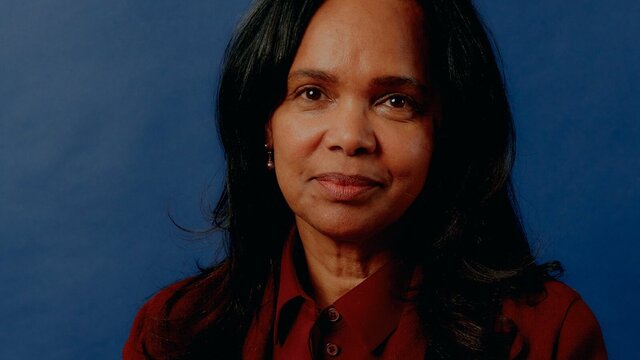 Priscilla Sims Brown, CEO of Amalgamated Bank. Born in 1957 to Ethiopian parents who were studying in New Mexico, she stayed behind when her mother and father returned to Africa. (Her mother, Marta Gabre-Tsadick, served as Ethiopia’s first woman senator.) Photo: NYT.
Priscilla Sims Brown, CEO of Amalgamated Bank. Born in 1957 to Ethiopian parents who were studying in New Mexico, she stayed behind when her mother and father returned to Africa. (Her mother, Marta Gabre-Tsadick, served as Ethiopia’s first woman senator.) Photo: NYT.
Tadias Magazine
Published: March 14th, 2023
New York (TADIAS) — In the following article The New York Times profiles Priscilla Sims Brown, the CEO of Amalgamated Bank, the largest union-owned bank in the US. Brown’s Ethiopian heritage (her mother Marta Gabre-Tsadick was the first woman to serve as a senator in Ethiopia) and unconventional upbringing, which included ten years living with an American military family in Germany, instilled in her a confidence to pursue an unconventional path. She rose through the ranks in the finance sector before joining Amalgamated in 2021. Under her leadership, the bank has prioritized issues such as workers’ and immigrants’ rights, racial justice, anti-violence, gun safety, affordable housing, and sustainability. Amalgamated is also the first bank to obtain a merchant category code for gun stores, and was one of the first companies to cover the costs of employees needing abortions following the U.S. Supreme Court decision that overturned abortion rights.
Below is an excerpt and link to the full article:
A Bank President Who Embraces the Unconventional
Priscilla Sims Brown’s atypical childhood has helped her lead a financial institution from a different perspective as Amalgamated Bank’s chief executive.
This article is part of our Women and Leadership special report that profiles women leading the way on climate, politics, business and more.
Priscilla Sims Brown, chief executive of Amalgamated Bank, said it was her uncommon upbringing that put her on the path to running the country’s largest union-owned bank.
Born in 1957 to Ethiopian parents who were studying in New Mexico, she stayed behind when her mother and father returned to Africa. (Her mother, Marta Gabre-Tsadick, served as Ethiopia’s first woman senator.) She spent the next 10 years living with an American military family in a small town between two American bases in Germany.
But after a government coup in Ethiopia in the 1970s, her parents fled the country and returned to the United States. Ms. Brown joined them, and they moved from place to place while establishing a Christian nonprofit to help Ethiopian refugees.
Ms. Brown said her background gave her the confidence to pursue a path that could be difficult for women, and particularly women of color.
“Having spent my formative years in Germany, there were a lot of people from a lot of places,” she said. “People can be made to feel inferior by difference. I was made to feel difference was pretty cool.”
It wasn’t until she was 14 and had returned to the United States that she experienced racism, Ms. Brown said. “I learned that racism existed, but I didn’t own the inferiority, I didn’t own the prejudice. I learned to lean into differences and be somewhat unconventional.”
Ms. Brown studied journalism at San Francisco State University, then landed a job at KQED, the local public radio and television station in the Bay Area. “I was first hired on the nightly news and I remember getting promoted to $4 an hour,” she said.

























